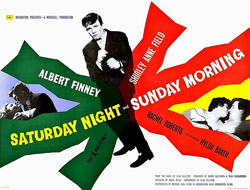Film: Saturday Night & Sunday Morning
Director: Karel Reisz
Country: Czech Republic / UK
Released: October 1960
Runtime: 89 minutes
Genre: Drama
Studio: Woodfall
Influenced: Lindsay Anderson, Ken Loach, Sally Potter, Andrea Arnold, Shane Meadows
Several of the "Free Cinema" movies of this British new wave were the fruit of Woodfall Films, a production company that was the brainchild of director Tony Richardson, playwright John Osborne and producer Harry Saltzman. Other great Woodfall Films include A Taste of Honey (Tony Richardson, 1961), about a young pregnant woman and an unflinching portrayal of working-class English life, and Tom Jones (1963), a joint production between Richardson and Osborne, starring Finney again in an adaptation of Fielding's novel about a bawdy young man trying to find his way in the world.
A key factor in Saturday Night & Sunday Morning's success was the superb acting. Albert Finney gives an iconic performance as Arthur Seaton, but he is also supported by a strong cast, including Rachel Roberts, Shirley Anne Field and Bryan Pringle. The writing, courtesy of Sillitoe, is sharp and witty and the dialogue is completely natural, making the characters believable. Seaton gets many of the best and most iconic lines in the film, including "don't let the bastards grind you down", a phrase that reappears in Margaret Atwood's Handmaid's Tale ("Nolite te bastardes carborundorum"). The film tackles the hot topic of abortion – which wasn't legalised in the UK until 1967 – making it timely and relevant.
Karel Reisz's direction is also excellent, bringing Sillitoe's novel to life with a mixture of beautiful black and white cinematography, which captures the look and feel of Nottingham in the early 1960s, and tight editing, ensuring the film moves along at a brisk pace and that there is never a dull moment. Yes, it can be bleak viewing at times, and the film certainly doesn't shy away from the harsh realities of working-class life, but it remains the best portrayal on screen of the "angry young man" archetype that defined the young generation of that time and would go on to inspire many of the best British bands for decades to come (The Beatles, The Kinks, The Smiths, Madness, Franz Ferdinand, Arctic Monkeys, etc).

Comments